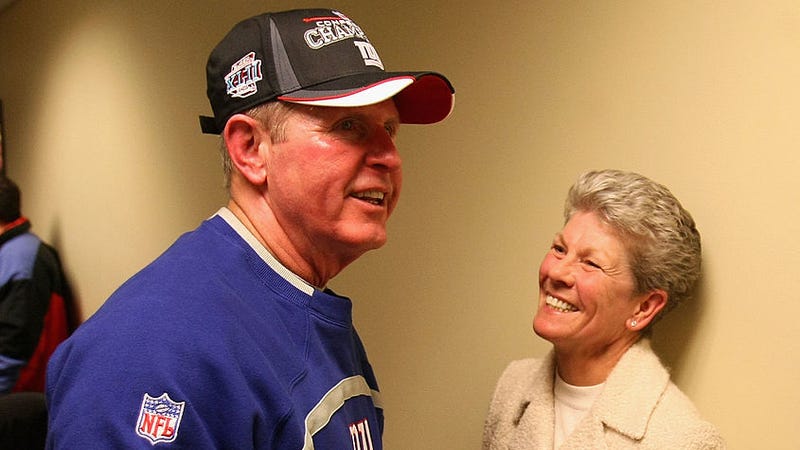
Longtime NFL coach and executive Tom Coughlin shared a heartfelt — and heartbreaking — message through a piece in the New York Times on Tuesday morning, detailing the difficult times he and his family have gone through in recent years due to his wife Judy's illness.
In the essay, titled "Nothing Could Prepare Me for Watching My Wife Slip Away," the 74-year-old Coughlin describes the illness his wife has been battling. He describes her transformation over the past four years, from a "gracious woman with a gift for conversation" to "losing almost all ability to speak and move." The disease responsible was finally pinpointed as progressive supranuclear palsy in 2020 after doctors spent years trying to diagnose her illness.
As defined by the National Institute of Neurological Disorders and Stroke, progressive supranuclear palsy (PSP) is a rare brain disorder that affects movement, walking and balance, and eye movement. Unfortunately, it is an incurable illness that progresses, as it's name suggests, and shares similarities to Parkinson's disease. Within three to five years of onset, patients become "severely disabled" and are more vulnerable to pneumonia, choking and other complications.
While Coughlin had struggled with the decision to either keep all of this private or reveal it to the public, he ultimately concluded that it may be helpful for others to read about his and his family's experiences.
"As so many of you are gearing up for another N.F.L. season, I will be sitting far from the sidelines, at the bedside and holding the hand of my biggest supporter, my beloved wife, the mother of our children and a grandmother to our grandchildren," Coughlin wrote.
He now finds himself in the role of a primary caregiver, writing that he shares this responsibility with tens of millions of fellow Americans. And he wants people to know that he's not seeking sympathy — "It's the last thing I want" — but that he wants others to know that whatever emotions they're feeling are okay. Frustration, exhaustion, sadness — Coughlin has experienced it all.
"I’ve learned firsthand caregiving is all-consuming. It is mentally and physically exhausting," he wrote. "Sometimes you just need a break. When Judy is having a good day, then my day is good.
"But then there are dark days — those days that are so full of frustration and anger, they have me feeling like a failure and pondering the unfairness of the disease. I’ve spent my entire life preparing for some of the biggest games a person could play, but nothing can prepare you to be a caregiver who has to watch a loved one slip away."
His final message is for those who want to know how they, too, can help, even if they're not going through the same difficult time.
"And for all those wondering how they can help, it’s simple: Don’t forget about the caregivers."
LISTEN on the Audacy App
Sign Up and Follow Audacy Sports
Facebook | Twitter | Instagram
